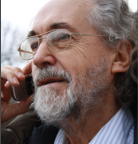How “scientific” is Quakerism?
“Science” says — first define your terms. Quakerism says — there’s more to life than words.
In his book, The Future Of An Illusion, Sigmund Freud used “science” to demolish “religion”. Reading this, as a teenager in a Quaker school, set the cat among the Quaker pigeons — was Quakerism equally doomed? At that time, “science” was transcendent. “God” less so. To pass exams we needed to prove things scientifically- if the gas rekindled a glowing splint, it was oxygen — if it didn’t, it wasn’t. Get that wrong, and your school career floundered. But applying the same logic to “God”, earned fewer plaudits. A different type of thinking seemed to be called for. Watching this tussle between “science” and “religion” for 70 years, a clear winner emerges, one which might surprise you.
Freud got his illusions the wrong way round. Even as he was lambasting “religion” in 1928, the writing was on the wall for “science”. Like all reformations, it’s taking time to sink in. You don’t need to be Einstein, but you do have to have enough self-confidence to apply the scientific rigour we were taught all those years ago. More, you need a measure of what I like to call, “spiritual stamina”. Why? Well, scepticism about “science” hits us all where it matters — our sense of Certainty.
Everything looked rosy in the 1900s. But by the 1920s, closer scrutiny of the electron demolished all that. Just look at the tag — “the Uncertainty Principle” — hardly the best slogan to inspire repeatability. And yet there it is. And there it stays. What it means is you have to choose, either where an electron is, OR where it’s going — you can never know both at the same time. Nothing (including us) moves without electrons, so that’s an eternal problem. Thus, for the brave-hearted, there’s at least as big a black hole in our knowledge of subatomic particles as ever there was with “religion”.
“God doesn’t play dice with the universe”. This might have bridged “science” and “religion”, except it doesn’t work in the everyday world, and never will. The postal service shows why. You can time your parcel’s departure, to the nearest femtosecond– but heaven only knows when it’ll arrive. And there’s no room on an electron for a tracking device, nor ever will be. If only electricity came in waves, then we’d have a chance. A wave travelling at a metre a second, would take exactly one second to reach you, if it was a metre away to begin with. But, since 1899, energy doesn’t flow — it comes in particles, small parcels known as Quanta. Uncertainty is built into our very subatomic foundations — there are no exceptions.
What to do? Technology succeeds, not by going through the front door, but by that standard engineering stock-in-trade — the “work-around”. Can “religion” offer anything equivalent? Well, usually not. Most “religions” hanker after the Certainty that “science” seemed to offer for so long. You are either one of us — or you’re a heretic, an infidel. For the myopic, Certainty relies on sameness — keep the wagons circled, to keep Uncertainty out.
Is Quakerism that different? Can Quakerism really step in to repair “science”? Well, it did for me. The “work-around” it gave me was to pay more attention to what worked, rather than to the words used to describe it. Quakerism recommends we seek to know each other in “the things that are eternal” — BUT, it refuses to define precisely (“scientifically”) what those “things” are — find out for yourself, or miss out altogether. “Science” says — first define your terms. Quakerism says — there’s more to life than words — letting your life speak, speaks volumes.
In November 1660, a bunch of Quakers told the English King that violence didn’t work. So what? For five years, I talked to 50 murderers in a UK Prison, explaining that anger could be healthy, but violence never was. “Science” had insisted no psychopath could ever change. But for three years, there was no violence on that one maximum security prison wing, down from 20 “incidents” a year for the previous seven. What they taught me was that only over-grown toddlers kill — an axiom too heretical for today’s “science” ethos.
Human beings are notoriously unreliable, as you can see every day. It takes an unusual perspective to see beyond that, to see that though Uncertainty is ubiquitous, humans can be more reliable than electrons. Quakerism provides oxygen for my personal spiritual stamina — could it for yours?
Dr Bob Johnson (retd) Consultant Psychiatrist, Monday, 17 February 2020
To see how this works out for mental health, check out Verbal Physiotherapy
***
Empowering intent detoxifies psychoses
How Verbal Physiotherapy works — https://www.smashwords.com/books/view/892956
e-mail DrBob@TruthTrustConsent.com
GMC speciality register for psychiatry reg. num. 0400150
formerly Head of Therapy, Ashworth Maximum Security Hospital, Liverpool, UK
formerly Consultant Psychiatrist, Special Unit, C-Wing, Parkhurst Prison, Isle of Wight, UK.
Author: Emotional Health ISBN 0–9551985–0-X & Unsafe at any doseISBN 0–9551985–1–8
